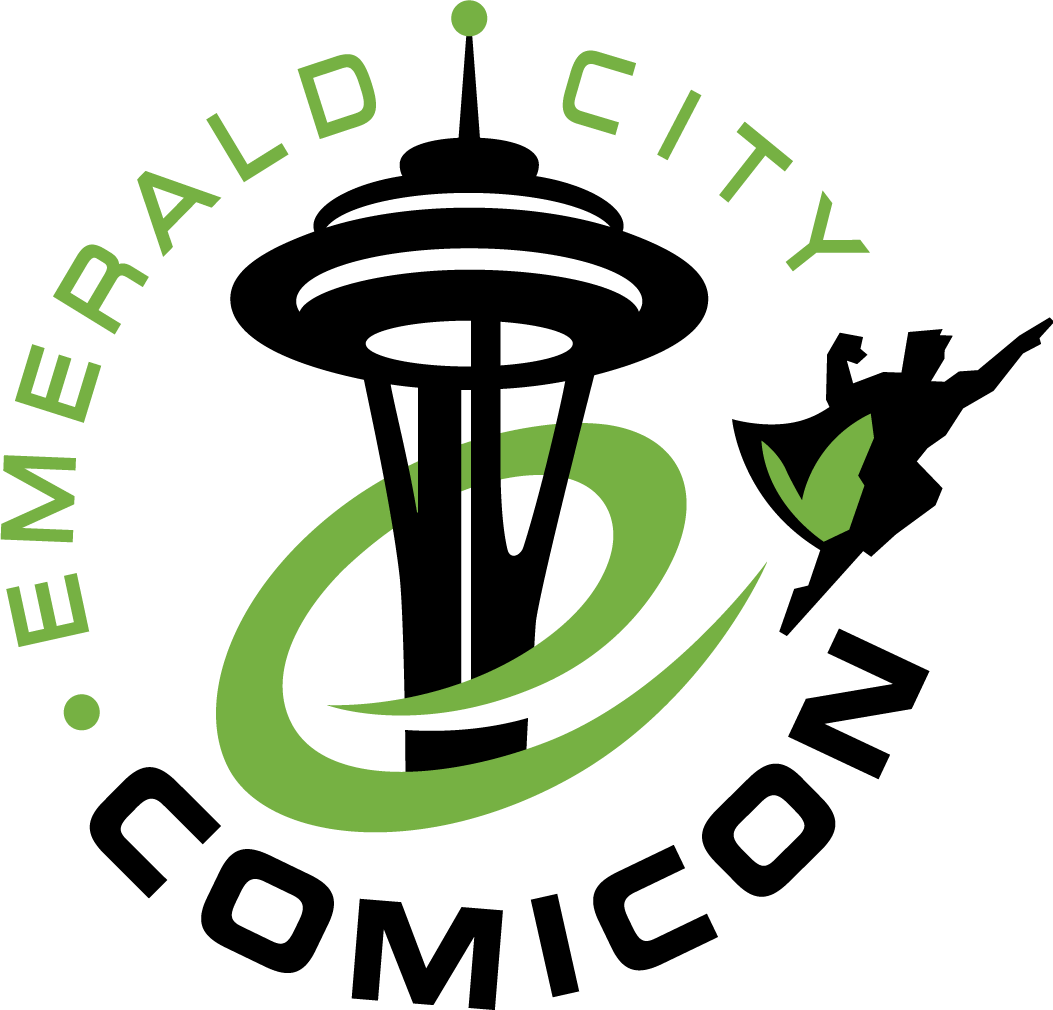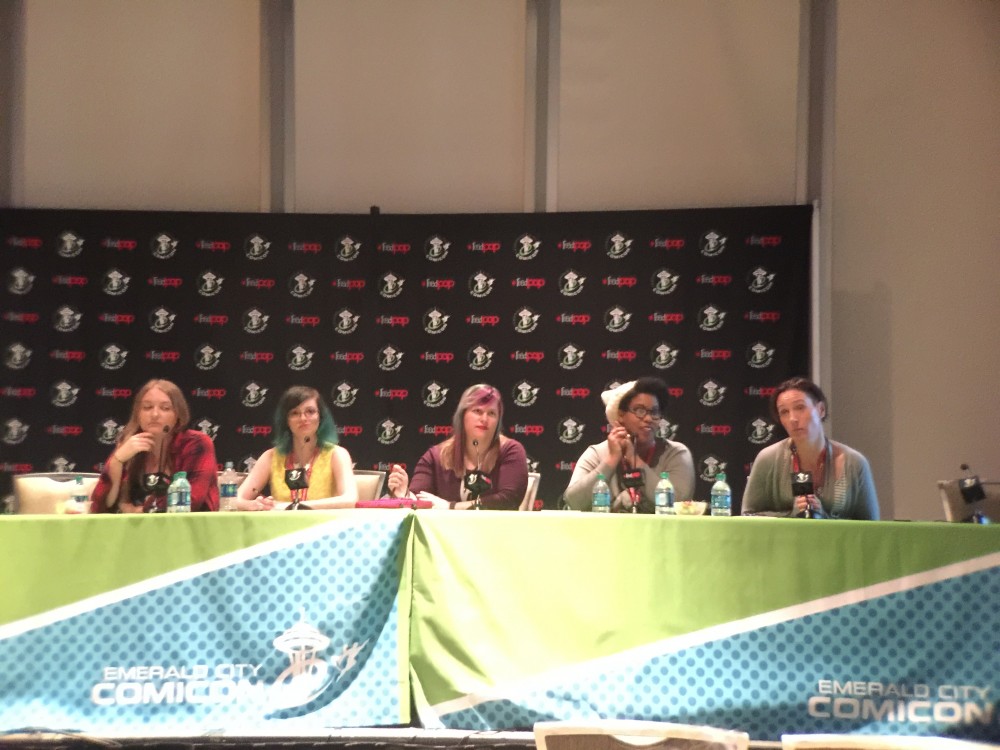By Victor Van Scoit
The Comic Book Women, an advocacy group helping raise the profile of women working in comics, had a great showing at Emerald City Comic Con this year with several panels this year. This wasn’t a case of putting women on a panel and focusing on their gender perspective. It was about providing a group of talented women that could share their experience and provide insight into how to make it in the comic book industry—resulting in a panel for everyone. I managed to attend Comic Book Women Present: You Made A Comic—Now Sell It! The panelists Jen Vaughn (artist, Fantagraphics), Amanda Meadows (The Devastator Publishing), Shy Allott (Oni Press), Rachel Reed (Oni Press), Alex De Campi (writer, No Mercy) held a lively panel sharing their great tips on self-promotion, using social media, and relating with press and retailers.
The panel, moderated by Jocelyn Gajeway (Drew Rausch) began by explaining that if you’re a creator you’re going to be juggling multiple responsibilities. Self-promotion and digital marketing are likely going to feel the most unnatural, but are necessary. The first tip was a reminder to believe in yourself. “Don’t ever say you suck. If you don’t believe in yourself other people aren’t going to believe in you.”, said Jen Vaughn. Alex De Campi agreed and added that it might take time to gain confidence and nail down the pitch for your comic down to a manageable chunk for buyers, retailers, or publishers. The entire panel agreed on how effective it was to be able to distill your ideas into a quick description. Your idea may be complex and beautiful but communicating it quickly is key. “You don’t need to count all the points on the snowflake,” Meadows concluded.
Once your comic book is finished and ready for solicitations the panel stressed how important it was to find someone to talk to about it—news, websites, bloggers, etc. Relationship building is the key. “Build relationships with the people in your community and online, because our community is vast and loud.”, said Shy Allott. Alternative ideas were offered to create situations with retailers to partner with and get your book noticed like signings, artist in residence for the day during new comic book days. “Bring them doughnuts even,” said De Campi. The relationship building continues into the social media realm. “You have to think about what makes your voice and your book different. You need to make other people’s jobs as easy and pleasant as possible,” said De Campi. For Twitter that included not just promoting your own work but tweeting about other topics that interest you, or other creators people should pay attention to.“Think creatively about ways you can incorporate your book while doing something that’s entertaining. The majority of your tweets should be entertaining or useful or helpful,” said Meadows. “That’s one of the most important lessons of social media,” say De Campi, “It’s 90% giving—not taking.”
The panel hit more of the details on using social media when Gajeway shared examples of templates any creator could benefit from. These templates, social media guides, and emails could be used to reach out to retailers, press, and the community. “Embrace the different forms of social media too. Twitter does specific things. Instagram does specific things,” said Allott. De Campi offered input from the creator’s perspective, “Tumblr is an amazing resource if you’re an artist. I know artists who have gotten DC and Marvel gigs off their fan art of Tumblr.” While the focus was on the panelists experience and not their gender, there was a moment in the panel that served to remind us what other things women have to consider. “There’s all these plugins but you’re not going to get the best picture quality. If you’re on Twitter you want [the formatting] super long and thin [otherwise] it’s going to crop out so it’s like, just your boobs and half your book, and you’ll think ‘Great. Thanks for selling it.’”, said Meadows.
The group made certain not to underplay how important the promotion and marketing of a comic book is. Allott emphasized, “Selling and promoting a comic is full time work. A lot of people have entire careers doing this. You want to be as effective and as broad as you possibly can. So having a tool like this where you have a system to work within it’ll save you time and you can move on to the next thing.” That kind of message might seem daunting but the tools they were sharing really were about enabling creators. “Mechanize the system. You want to make promoting a well oiled machine so it doesn’t feel like it’s distracting you from the creative—making the thing you want to make,” said Meadows. Continuing on creating that mechanized system the topic moved on to retailers. When contacting retailers it’s equally important to keep organized as well. This allows a creator to keep focused, and respectful of the retailers time and role. Keeping emails short and direct was touted. “The sweet spot is 150 words, no more than that. Once you get longer than that no one’s paying attention. They’re like ‘This person wants a lot from me. I’ll just mark it as unread and move on with my life,’” said Meadows. “Spreadsheet everything.”, said Allott, “Put all the retailers you talked to, the last time that you called them, and what you talked about.”
Talking about retailers lead to a significant note about the community, and who in particular was a standout. Allott mentioned the positive role that The Valkyries have been doing in the comic book community. Allott began by pointing out a unique column in one of the templates. “I don’t know if you can read it, but it says ‘A rad Valkyrie works here’. Valkyries are females working in comic book shops or own comic book shops or are buyers. It’s a very specific section of our community and an incredibly powerful one that I can not talk up enough. They are movers and shakers. They’re really incredible and they’re vast. They have sincere buying power. I hate to put it in those the terms, but The Valkyries, if they like something, it’s Saga it’s Lumberjanes it’s stuff that we’re all familiar with now because The Valkyries were instrumental in getting it there.”
It was obvious the panel was excited to get all this information out in the hopes of empowering existing and future creators. A key part of succeeding is streamlining the business side, so you can get back to the creative side. More importantly is to remember there’s a community out there that creators need to learn how to engage with. The key takeaway for me was that the Comic Book Women are definitely achieving their goal of showcasing talented women at comic book convention panels, and I hope to see more at future conventions.
Any current and future creators can find the presentation materials for Comic Book Women Present: You Made A Comic—Now Sell It! provided by Jocelyn Gajeway.









